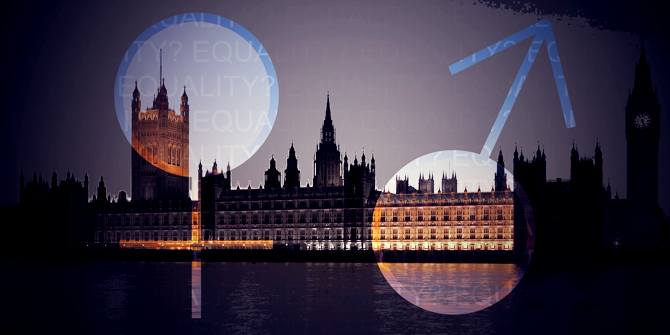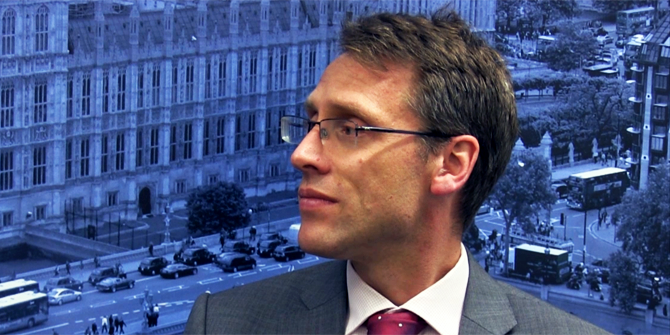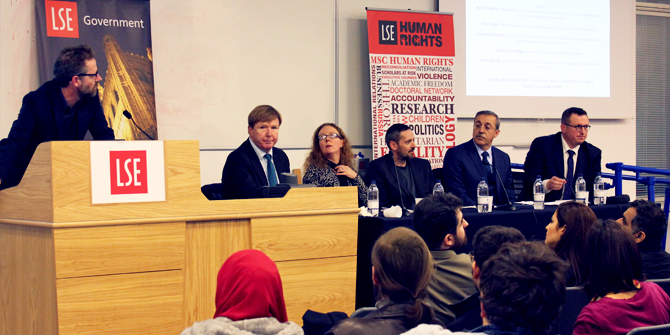
We ask Professor Anne Phillips, PhD candidate Marta Wojciechowska and MSc student Emily Wolff to reflect on recent sexual harassment allegations in Westminster. What does this scandal tell us about the state of gender equality in politics and how political institutions should change?
The gatekeepers to power are predominantly male
 What’s new about recent revelations of sexual harassment at Westminster, the Scottish Parliament, the Welsh Assembly? Women have been reporting the sexist behaviour of male colleagues for what seems like decades: the breast-obsessed MPs mimicking the weighing of melons when a woman gets up to speak; the barking; the patronising ‘calm down dears’. One difference is the exposure of more directly threatening one-to-one harassment, including possible cases of rape; another is the seemingly widespread acknowledgement that this is no longer to be brushed aside as mere locker-room talk. But the reports confirm what has been apparent from many studies: there is a persistent sexualisation of women that may or may not be experienced as threatening, but is always diminishing of their political and professional credentials.
What’s new about recent revelations of sexual harassment at Westminster, the Scottish Parliament, the Welsh Assembly? Women have been reporting the sexist behaviour of male colleagues for what seems like decades: the breast-obsessed MPs mimicking the weighing of melons when a woman gets up to speak; the barking; the patronising ‘calm down dears’. One difference is the exposure of more directly threatening one-to-one harassment, including possible cases of rape; another is the seemingly widespread acknowledgement that this is no longer to be brushed aside as mere locker-room talk. But the reports confirm what has been apparent from many studies: there is a persistent sexualisation of women that may or may not be experienced as threatening, but is always diminishing of their political and professional credentials.
As many have said, there is a particular power dynamic at work in politics (as in the film and theatre world), where the gatekeepers to power are predominantly male and the newcomers very often female. One of the ironies, indeed, is that the measures to increase the proportion of women elected as MPs, combined with the increasing numbers now working as researchers, support staff, or journalists, can heighten this dynamic. The newer entrants are more likely to be both female and young, in ways that may shift the gender balance, but not so automatically the power.
There is no reason – beyond centuries of patriarchy – why a young woman should be more defined by her gender than a young man, but it is evident from the accounts that being young and female is taken as a marker of sexual availability, crowding out measures of professional worth. And I don’t think this is just a matter of time-lag: of the culture taking its time to catch up with legal, educational and economic change. Representing women primarily as sexual beings is not just a hangover from the past, but often an active response to the threatening encroachment of women into what too many men have considered their own ‘natural’ sphere of influence. I don’t hold out much hope of this being the watershed many now talk of.
Anne Phillips is Graham Wallas Professor of Political Science in the LSE Department of Government and author of ‘The Politics of Presence: the Political Representation of Gender, Race, and Culture’
The core political system needs radical reform
 Recent sexual allegations do not prove that Westminster is an unequal political institution. It is not, it has never been, and it was never designed to be so. Instead, the sexual harassment scandal proves that in the modern UK the less powerful are truly powerless. While this case concerns women in politics, the powerlessness extends beyond and includes various racial, religious, gender and sexual minorities which constitute British society. In a wider perspective, the sexual allegations show that the UK representative system does not work and requires a radical democratic reform.
Recent sexual allegations do not prove that Westminster is an unequal political institution. It is not, it has never been, and it was never designed to be so. Instead, the sexual harassment scandal proves that in the modern UK the less powerful are truly powerless. While this case concerns women in politics, the powerlessness extends beyond and includes various racial, religious, gender and sexual minorities which constitute British society. In a wider perspective, the sexual allegations show that the UK representative system does not work and requires a radical democratic reform.
From the perspective of the classical theories of representation, elected and accountable representatives are the ones who have the resources to make the best decisions for the whole society. According to this argument, professional representatives, thanks to their education, time and training, are able to respect and include the best interests of lay people, including those underprivileged and excluded.
However, our representatives fail to do so. The very people who are supposed to protect the less powerful are using their privilege for a doubtful gain. When these representatives fail to respect the well-being of their female colleagues, who they personally know and who are in many ways similar to them, the representatives’ wider claim for including the best interests of all members of society is seriously undermined. Hence, the way forward is not an additional system of checks on MPs but rather a radical political reform within the core political system. The introduction of more inclusive, bottom-up and participatory institutions can create more equal politics. The shape of these institutions should be the main topic of our discussions in the aftermath of the sexual allegations scandal. It is a time to start those discussions now.
Marta Wojciechowska is an LSE100 Fellow and a PhD Candidate in the LSE Department of Government. Her research focuses on how to make democracy better and more adequate to the challenges we currently face.
We must hold political institutions to account on gender equality
 The sexual harassment scandals in Westminster may be hard to stomach, but it was high time that they broke. Politics has long been fertile ground for ‘unwanted behaviour of a sexual kind’. With career progression depending heavily on personal loyalty and patronage, women have for decades been forced to accept it.
The sexual harassment scandals in Westminster may be hard to stomach, but it was high time that they broke. Politics has long been fertile ground for ‘unwanted behaviour of a sexual kind’. With career progression depending heavily on personal loyalty and patronage, women have for decades been forced to accept it.
The fact that it was accepted, of course, does not mean that it was acceptable, a distinction that seemed to escape Michael Fallon following his resignation as defence secretary. Recent allegations in Hollywood and Westminster alike represent the expansion of the fight for gender equality into struggle over boundaries of the socially acceptable.
A victory on this cultural front arguably matters more in politics than entertainment. By virtue of their responsibilities to manage and regulate everyday life, political institutions are, as Pierre Bourdieu wrote, “charged with ensuring the perpetuation of the order of genders.” They can sanction and amplify private patriarchy – or they can reject and thereby weaken it. To achieve the latter, the revised complaints procedure agreed by party leaders earlier this month is not sufficient. It requires popular support, publicity and, unavoidably, scandals.
Why? MPs are not employed in any legal sense of the word. They may forget it behind closed doors, but political legitimacy is in perpetual mutual constitution by the electorate and the elected. It is up to us to distinguish the knights from the knaves, and hold them accountable. Three cheers to the women who have come forward to help us do so.
Emily Wolff is an MSc Global Politics student in the LSE Department of Government, interested in inequality, political economy and global change.
Note: this article gives the views of the authors, and not the position of the LSE Department of Government, nor of the London School of Economics.





